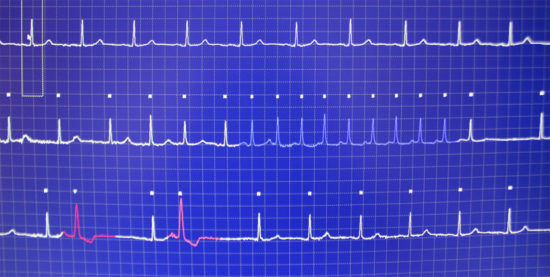Heart Flutter
We can help.
At Cardiology Specialists, we can help work out whether your heart flutter (palpitations) is important or safe. Your heart rate is controlled by an electrical conduction system within the heart muscle which increases the heart rate when you exercise and and slows it when you rest. A number of conditions can affect the heart rate or rhythm. Heart rate simply refers to how fast your heart is beating.
Heart Racing
Heart racing (tachycardia) refers to heart rhythm that is faster than normal. Heart racing may include a normal increase in heart rate (sinus tachycardia). Ectopic beats (extrasystoles) is where extra beats occur in addition to the normal heart beat that make the patient feel the heart beat “pause then thump” or “butterflies”. Heart racing that is irregular and oftern fast may be due to atrial fibrillation. Symptoms include fatigue, palpitations (where you are aware of your heart racing or pounding), dizziness and breathlessness. A supraventricular tachycardia (SVT) is where the heart suddenly goes very fast and regular due to a short circuit in someone who may otherwise be very well.
Slow Heart Beat
This refers to heart beat that goes slower than normal (bradycardia). The most common form is problems with the wiring (conduction system) of the heart. This is because messages from the electrical generator of the heart don’t get through efficiently to the rest of the heart and hence it goes slow or can pause. Symptoms of the heart going too slow include feeling tired, breathless or fainting. Atheletes may have a slow resting heart rate due to training.
Investigations
Resting Electrocardiogram (ECG).
A Resting ECG at Cardiology Specialists is an electrical tracing of your heart. Electrodes are placed on the skin of your arms, legs and across chest to measure electrical activity of the heart. It gives information about heart rate, evidence of old heart attacks, thickening of heart muscle, or heartbeat problems such as extra (ectopic) beats or atrial fibrillation.
24 hour Ambulatory Holter Monitor (Heart rate monitor)
 A 24 hour Holter Monitor at Cardiology Specialists is where a continuous heart rate tracing is obtained to measure relationship between symptoms and heartbeat. Electrodes are applied to your chest under your clothes by trained staff to measure continuous measurement of heart rate and rhythm over 24 hours. The electrodes are attached to a small portable recorder. You can mark the recording at any time you have heart flutters or other symptoms. It is important to keep a diary so your symptoms can be compared to your heart rhythm at same time. The 24 hour Holter Monitor at Cardiology Specialists is useful to detect different types of palpitations including: extra heart beats (ectopic beats), fast regular heart beats (supraventricular tachycardia (SVT), irregular heart rhythm (atrial fibrillation), and ventricular tachycardia (VT). Patients with intermittent atrial fibrillation are at similar risk for stroke compared to patients in atrial fibrillation all the time.
A 24 hour Holter Monitor at Cardiology Specialists is where a continuous heart rate tracing is obtained to measure relationship between symptoms and heartbeat. Electrodes are applied to your chest under your clothes by trained staff to measure continuous measurement of heart rate and rhythm over 24 hours. The electrodes are attached to a small portable recorder. You can mark the recording at any time you have heart flutters or other symptoms. It is important to keep a diary so your symptoms can be compared to your heart rhythm at same time. The 24 hour Holter Monitor at Cardiology Specialists is useful to detect different types of palpitations including: extra heart beats (ectopic beats), fast regular heart beats (supraventricular tachycardia (SVT), irregular heart rhythm (atrial fibrillation), and ventricular tachycardia (VT). Patients with intermittent atrial fibrillation are at similar risk for stroke compared to patients in atrial fibrillation all the time.
Echocardiography
Echo at Cardiology Specialists uses ultrasound to measure function of heart chambers and heart valves. Echo is also called Cardiac Ultrasound, which uses high frequency sound waves and is similar to a gall bladder or pregnancy ultrasound but is instead focused on the heart. Professor Hamid Ikram pioneered the introduction of Echo to Canterbury. At Cardiology Specialists, Echo is performed by a specially trained technician who moves a plastic transducer on the skin of the chest wall to obtain pictures of the heart chambers and valves. Echo (cardiac ultrasound) is useful for diagnosing weakened heart muscle, old heart attacks, heart valve narrowing or leaking, thickening of heart muscle, holes between heart chambers, or fluid in the sack around the heart.
